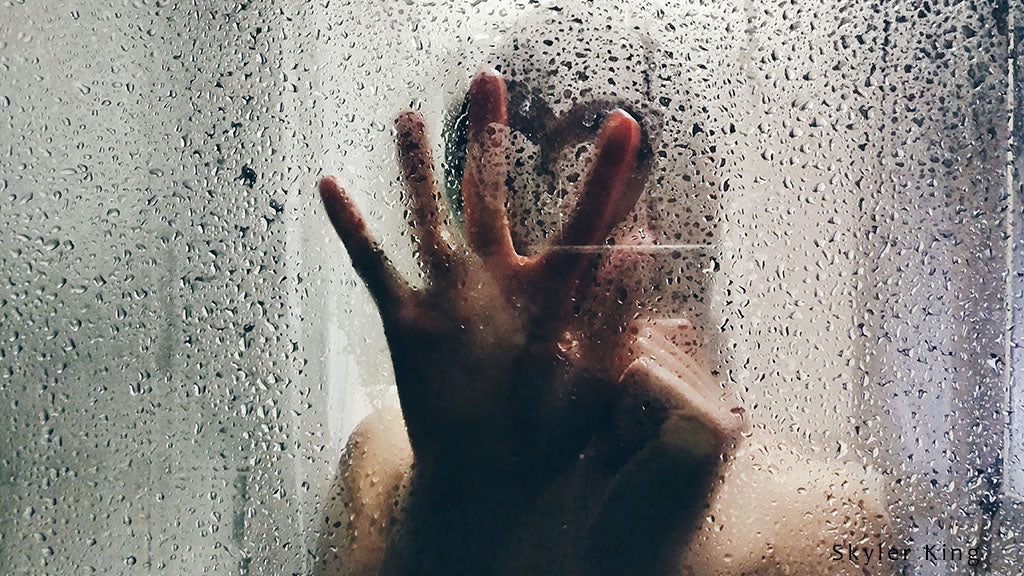
We’re not trying to be buzz-kills here, but showering is really an awful thing to do to your skin. You strip it of oils, damage proteins and dehydrate it leading to degradation of skin repair and replacement. But fear not, it doesn’t have to be this way. Showering can be a great way to give back some of the oils, minerals, vitamins that your skin needs - while getting clean. We’ll show you how.
1) Hot Water = Skin stripping
When you step into a hot stream of water, without even breaking out the shower gel you are stripping your skin of oil and moisture. One thing you might consider is lowering the temperature of the water a tad. The cooler the water, the less oils will be washed away.
Also, when we run water over our skin it absorbs some of the water and swells. As soon as we step out of a hot shower this water starts evaporating. Because we’ve stripped the skin of a layer of protective oils, this evaporation leads us to lose more water from the skin than it had when we first stepped in. Now you have what is known in the trade as “after-wash tightness” (AWT). Your skin is dehydrated and with a decreased barrier function.
Hydrating your skin in the shower can be a good thing. When your skin is wet it more readily absorbs any nourishing active ingredients in your shower product. Also, if your shower product contains humectants and occlusive agents, it is a great opportunity to lock that moisture into the skin for the day ahead.
2 ) Bubbles = Harsh surfactants
Bubbles are a marketing tool. I talk about this a bit more here. Our beef with bubbles is that they don’t get you clean, they don’t do anything really, but they do indicate a harsh surfactant/detergent and a lack of any goodies that will benefit the skin like oils or active ingredients that tend to suppress foam.
3) Fragrance = Skin irritants
Now, this is a controversial one. Synthetic fragrances aren’t all irritants. Quite a lot of essential oils that are promoted as natural fragrances can irritate the skin. Our problem with fragrance in shower products is that there is so much of it. Take any brightly coloured shower gel and look at the ingredients. See how far up the ingredients list parfum/fragrance is? That’s not good. It means that a heady fragrance that slaps you awake as you slather it over your skin makes up a large proportion of the product. Too much of anything is going to irritate your skin. A product that is largely made up of water, harsh cleansers, thickeners, tons or fragrance is not a good mix for a healthy epidermis.
What you can do about it
The good news is that you can turn this all around. You can turn that 5 minute skin torture into 5 minutes of gentle nourishing, rebalancing and moisturising - setting you up for glowing skin the rest of the day.
There are shower creams, oils and gels out there that contain a few ingredients that can help support skin structure and natural biome while also attracting and locking in moisture keeping the skin healthy and plump.
Here’s some of the ingredients you should look out for in your shower or bath products.
Oils
Oils have been proven to be great for the skin. There are two types of oils to look out for; the first are carrier oils like sunflower oil or castor oil. These oils can have various jobs such as diluting sebum and so preventing acne or acting as emollients or occlusives to keep the skin moisturised. The second are essential oils. These are distilled from plants and can be used to fragrance (they are used in aromatherapy) but also as natural antibacterials, antioxidants and skin toners.
Actives
Active ingredients in shower products are more easily transferred deep into your skin, where they can do most good, when you are wet. Active ingredients like distillations of plants with high vitamin C, B or E can help support the extracellular matrix of the skin and act as antioxidants. Some, like Allantoin, found in Comfrey can help the skin heal itself, replenishing fresh new skin cells.
Occlusives
Occlusives create a physical barrier over the top of the skin locking in moisture. Some oils like Castor act as occlusives. Glyceryl Oleate is another commonly used occlusive found naturally in the skin and especially in the covering of newborn babies to prevent dehydration.
Emollients
Emollients soften the skin and let water and other ingredients soak in and moisturise. Some oils like Argan have emollient properties. Cetyl alcohol, a fatty alcohol is a well known emollient that softens and prevents dry scaly patches on the skin.
Humectants
Humectants draw moisture from the air (or the shower) to your skin and hold it there. The most commonly found humectant in skin care is Glycerin. Honey is also a wonderful humectant. Attracting water to your skin is an important job as you can’t, or don’t want, to lock in moisture with too much skin suffocating occlusive agent.
Let’s face it, no one is going to give up showers, it’s one of the things that sets us up for the day. When you do shower though, do it right. Always moisturise in the shower or immediately afterwards. Set your skin up for moisture rich repair and rejuvenation and it’ll thank you for it by glowing all day.
Further reading
https://www.ncbi.nlm.nih.gov/pubmed/18199943
https://patriciakate.com/2017/04/11/what-is-after-wash-tightness/
